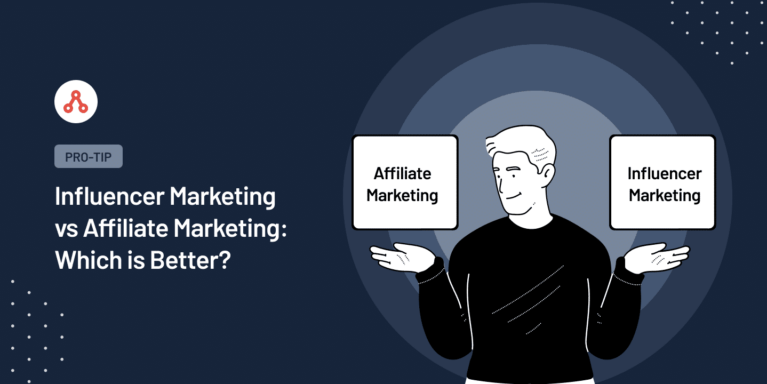
New in RewardsWP: Points, Redesigned Rewards Widget & More
RewardsWP now includes Points, a redesigned Rewards Widget, and new tools to launch, run, and measure loyalty and referrals in one place.
Continue Reading →
RewardsWP now includes Points, a redesigned Rewards Widget, and new tools to launch, run, and measure loyalty and referrals in one place.
Continue Reading →
Ever wondered what the difference is between influencer marketing and affiliate marketing?
Not sure which one is the best choice for your business? Don’t worry, we’ve got you covered!
In this guide, we’ll explain what influencer and affiliate marketing are, how they’re different, and help you determine which might be the best for your business.
Let’s get started!

Influencer marketing is a type of marketing that focuses on using key leaders, or influencers, to drive your brand’s message to the larger market.
Instead of marketing directly to a large group of consumers, you instead pay influencers to get out the word for you.
Social media influencers can be anyone from celebrities to popular online personalities.
These influencers have a large follower base, often in the thousands or even millions, and their followers value their opinions and recommendations.
When an influencer promotes a product, service, or brand, their followers will likely trust and act on that promotion, leading to increased brand awareness, customer engagement, and sales.
Influencer marketing comes in many shapes and sizes, and each type serves a unique purpose.
Here are some of the most common types:
Influencer marketing, like any other business strategy, has advantages and disadvantages.
It is a dynamic tool that can drastically improve a brand’s visibility and reputation and carries potential challenges and risks.
Let’s delve deeper into the pros and cons of influencer marketing:

Affiliate marketing, often misunderstood but highly valuable, is a marketing practice that has seen significant growth in the age of digital commerce.
This performance-based marketing model is an effective strategy for large and small businesses to increase their brand visibility and scale their operations.
However, to fully grasp the concept, it is crucial to delve deeper into its intricate workings.
Affiliate marketing is a collaborative profit-sharing model between a business or merchant and an affiliate marketer.
This relationship is bound by a mutual agreement where the affiliate promotes the merchant’s products or services.
In return, the merchant rewards the affiliate with a commission for every customer brought in through the affiliate’s unique referral link.
Affiliate marketing has a significant advantage: businesses can use their affiliates’ audiences and networks to reach more potential customers and boost sales.
By teaming up with publishers with a large and engaged audience, businesses can expand their reach and increase their chances of making sales.
But remember, managing affiliate marketing requires careful monitoring. Businesses must ensure that affiliates promote products that align with the brand and follow the law.
That’s where a reliable affiliate management tool like AffiliateWP comes in handy. It helps businesses keep track of their affiliates and ensures everything runs smoothly.
Like any business strategy, affiliate marketing comes with its own set of benefits and drawbacks.
You might have understood what influencer and affiliate marketing are by now. However, the main question is still unanswered.
What’s the difference between the two, and which one is better for your business?
Let’s find out.
Although influencer and affiliate marketing may seem similar, and there can be overlap, each strategy has distinct characteristics.
The key differences lie in the marketing approach, the relationship with the audience, payment structures, and the overall objectives.
Influencer marketing is all about leveraging the influence of individuals with a substantial following and engagement on social media.
However, affiliate marketing involves affiliates (individuals or companies) promoting a brand’s products or services and earning a commission for every sale they drive through their unique referral link.
Influencer marketing often relies on influencers’ bonds and trust with their audience. Their followers value their opinions and recommendations.
But, affiliate marketers may not necessarily have the same level of personal connection with their audience. Their focus is often more on providing valuable content that drives conversions.
Payment in influencer marketing is typically upfront. Brands pay influencers for their promotional services, including posts, videos, stories, etc. The cost can vary depending on the influencer’s reach, engagement rates, and other factors.
In contrast, affiliate marketing operates on a performance-based payment structure. Affiliates earn their income based on the number of sales or leads they generate for the brand. This is usually tracked through unique referral links or promo codes.
Influencer marketing primarily builds brand awareness, enhances brand image, and reaches a broader audience.
Affiliate marketing, however, is more conversion-focused. The objective is to drive sales and generate leads. This strategy is more about immediate results and revenue generation.
Check out this difference table to understand the distinction between influencer marketing and affiliate marketing in more simple words:
| Characteristic | Influencer Marketing | Affiliate Marketing |
|---|---|---|
| Marketing Approach | Taps into the existing communities of influencers for promotional purposes. | Focuses on driving leads and conversions through unique referral links. |
| Relationship with Audience | Relies on the personal bond and trust between the influencer and the audience. | May not necessarily have a personal bond with the audience, focuses more on providing valuable content. |
| Payment Structure | Typically upfront payment based on the influencer’s reach and engagement rates. | Performance-based payment; affiliates earn a commission for every sale or lead they generate. |
| Overall Objective | Brand awareness, enhancing brand image, reaching a broader audience. | Driving sales, generating leads, immediate results, and revenue generation. |
Choosing between influencer and affiliate marketing ultimately depends on your business’s specific objectives, budget, and overall strategy.
In certain situations, one might be more beneficial than the other, and understanding your business’s unique needs can help you make this decision.
Influencer marketing, focusing on leveraging the trust and credibility of influencers, can be a powerful tool for building brand awareness, reaching a broader audience, and enhancing your brand image.
It allows you to tap into an influencer’s existing audience, making reaching potential customers interested in your products or services easier.
However, this strategy often requires a significant upfront investment, and the return on investment can be more difficult to quantify directly, as the benefits are usually long-term and indirect.
On the contrary, affiliate marketing is a performance-based strategy that focuses on driving sales and leads. It can provide a more direct return on investment as affiliates are only paid for the sales or leads they generate.
This approach can be a cost-effective way to drive conversions, as you only pay for results.
But, it requires careful management and monitoring to ensure the affiliates promote your brand effectively and ethically.
Even though these marketing strategies have distinct pros and cons, the good news is that with a tool like AffiliateWP, you can integrate both approaches effectively. AffiliateWP is a comprehensive affiliate marketing tool that can be a game-changer for your business.
Not only does it help you manage and track your affiliates and their performance and offers opportunities to collaborate with influencers who can act as affiliates.
AffiliateWP allows you to leverage the power of both influencer and affiliate marketing, getting the best of both worlds.
The main difference lies in the objective and payout structure. Influencer marketing aims to leverage the trust and audience of an influencer to build brand awareness and reputation. In contrast, affiliate marketing is performance-based, focusing on driving direct sales or leads. Affiliates get paid for the results they generate (sales/leads), while influencers are often compensated upfront for their promotional efforts.
Absolutely. Tools like AffiliateWP allow you to effectively combine and manage influencer and affiliate marketing strategies, leveraging both benefits to optimize your marketing efforts.
Generally, influencer marketing can require a more significant upfront investment since influencers often charge fees for their services. Affiliate marketing, on the other hand, is typically performance-based, meaning you only pay for the results (sales or leads) affiliates generate.
After understanding influencer marketing and affiliate marketing, it’s clear that both strategies can significantly contribute to your business’s growth.
You don’t have to choose one over the other when you can blend them strategically.
You can use AffiliateWP, a powerful tool for managing affiliates, which serves as a perfect bridge between these two marketing approaches. It enables you to run a strong affiliate program while utilizing the influence of influencers.
With AffiliateWP, you can track and manage your affiliates’ performance and offer unique opportunities to influencers to become affiliates themselves.
Check out more helpful guides:
Are you ready to take your business to new heights?
Start your transformative journey with AffiliateWP today and harness the power of both approaches.
Disclosure: Our content is reader-supported. This means if you click on some of our links, then we may earn a commission. We only recommend products that we believe will add value to our readers.
Launch your affiliate program today and unlock a new revenue channel to grow your business faster.
We use cookies to improve your experience on our site. By using our site, you consent to cookies.
Manage your cookie preferences below:
Essential cookies enable basic functions and are necessary for the proper function of the website.
Statistics cookies collect information anonymously. This information helps us understand how visitors use our website.
Marketing cookies are used to follow visitors to websites. The intention is to show ads that are relevant and engaging to the individual user.